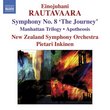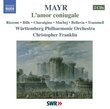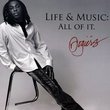| All Artists: F. Schmidt, Kristjan Jarvi, Tonkunstler Orchester, Wiener Singverein Title: Franz Schmidt: Das Buch mit sieben Siegeln [Hybrid SACD] Members Wishing: 0 Total Copies: 0 Label: Chandos Original Release Date: 1/1/2008 Re-Release Date: 4/29/2008 Album Type: Super Audio CD - DSD Genre: Classical Styles: Opera & Classical Vocal, Symphonies Number of Discs: 2 SwapaCD Credits: 2 UPC: 095115506127 |
Search - F. Schmidt, Kristjan Jarvi, Tonkunstler Orchester :: Franz Schmidt: Das Buch mit sieben Siegeln [Hybrid SACD]
![Franz Schmidt: Das Buch mit sieben Siegeln [Hybrid SACD]](https://nationalbookswap.com/cd//l/29/0929/6170929.jpg) | F. Schmidt, Kristjan Jarvi, Tonkunstler Orchester Franz Schmidt: Das Buch mit sieben Siegeln [Hybrid SACD] Genre: Classical |
Larger Image |
CD DetailsSimilar CDs |
CD ReviewsAn SACD Recording of Franz Schmidt's Crowning Masterpiece J Scott Morrison | Middlebury VT, USA | 05/27/2008 (5 out of 5 stars) "I know only one other recording of Franz Schmidt's 'The Book with Seven Seals', and it has served me well for many years: Dimitri Mitropoulos leading the Vienna Philharmonic with absolutely first-class soloists Anton Dermota, Fritz Wunderlich, Hilde Gueden and Walter Berry, recorded live at the Salzburg Festival in the early 1960s. It is a stunning performance but the recorded sound is now dated. Frankly I never sought out another recording of this towering work. But now there are a number of newer recordings -- among them those led by Franz Welser-Möst, Fabio Luisi and Nikolaus Harnoncourt -- and thus, having not heard them, my review of this 2CD set conducted by Kristjan Järvi will necessarily be lacking comparisons. The present recording is compiled from two live performances in 2005 and is the only one I know of on hybrid SACD; the sound on this recording is magnificent. The orchestra is the Tonkünstler-Orchester Niederösterreich, the chorus the Wiener Singverein. It was recorded in Vienna's Musikverein.
Franz Schmidt (1874-1939) was a younger contemporary of Gustav Mahler and in some ways was his compositional rival in Vienna. He studied composition with Anton Bruckner and was both a fine pianist and a professional cellist; indeed, he was principal cellist in the Wiener Philharmoniker and the Hofoper orchestra under Mahler. He was much better known during his life than he has become since his death in 1939. He is known these days primarily for this oratorio, his four symphonies and a fine body of chamber music. His compositions have a continuity with the late Romantic Austrian composers and even some similarity to those of Mahler; he did not join in the so-called Second Viennese School although in his later years he did use more angular harmonies. The Book with the Seven Seals is based on St. John the Divine's Book of Revelation as it describes the Apocalypse. St. John, the narrator whose extensive part is the major role here, is portrayed as a young man and sung by a heldentenor. In this recording Johannes Chum, with his lean and young-sounding voice, does a superlative job equalling, in my opinion, that on the old Mitropoulos recording. The Voice of the Lord is sung by Robert Holl, a bass whose rich voice has unfortunately developed a bit of a wobble in recent years. (I know that René Pape has recorded this role and can only wish he had been selected for this performance.) Still, Holl portrays the role effectively otherwise; indeed, he has performed it numerous times and recorded it previously when, I gather, he was in fresher voice. And the role is relatively brief. The rest of the vocal soloists, whose parts are also relatively brief, sing well. The other principal role, if one can call it that, is that of the chorus and in this performance the Wiener Singverein are thrilling. The orchestra is that of Graz, Austria where performances of this oratorio have become a tradition. They may not be the Vienna Philharmonic, but they are quite a good band and they clearly have the work in their bones. Young Kristjan Järvi, one of two conductor sons of Neeme Järvi, leads a thrilling performance. The sound, in this live recording, is exceptionally clear and rich in both the SACD and regular stereo versions. One has a sense of the space around the musicians, an immediacy that adds to the sense of occasion. Vigorous applause of the otherwise quiet audience is included at the conclusion of the performance. The thick glossy booklet contains a fine essay about the work -- including a good deal of information about Schmidt's dealing with the Nazis -- and a German libretto with English and French translations. CD1: 64:04; CD2: 48:55 Vigorously recommended. Scott Morrison" |





